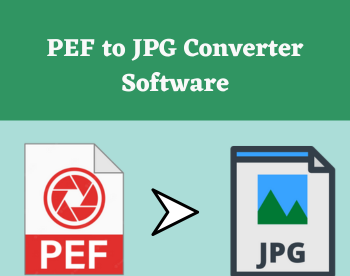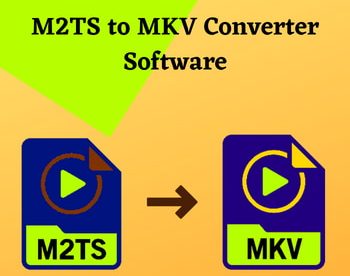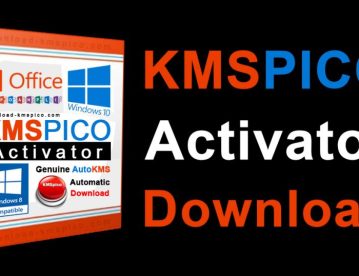10 Best Free Open Source Budgeting Software For Windows
Here is a list of best free open source budgeting software for Windows. These open source software are completely free and you can download setup as well as source code of these software. You can also make changes to the code of these budgeting software without any restriction.
These open source budgeting software are similar to the budget software listed here > Budgeting Software. These also let you create monthly, yearly budgets. With most software, you can also create personal budgets. However, some software can also be used to create budgets for multiple users. To create a budget, first, you need to make expenditure categories like Food, Transport, Entertainment, etc. For each expenditure category, you need to define a monthly or yearly budget. After that, you just need to regularly update your expenses into these software in order to maintain budget.
Most of these software can be used to track profit, loss, transaction, investment, etc. Plus, these software also work with currencies of multiple countries so that users can select currencies of their countries for budgeting. Plus, options to specify account type (cash, loan, investment, assets, etc.) are also available. You can also generate complete reports regarding budget, investment, expenses, cash flow, etc. Plus, some software provide pie chart, bar chart, etc. graphs to give you a better visual representation of financial status.
My Favorite Open Source Budgeting Software For Windows:
Money Manager EX is my favorite software because it lets you make budgets, track expenditure, track income, etc. More importantly, it also provides various reports (Budget performance, Payee report, Expense report, etc.). It also lets you save all the generated reports in CSV, XML, HTML, or QIF format.
You can also check out lists of best free Money Management, Open Source Billing, Portfolio Management software for Windows.
Money Manager EX
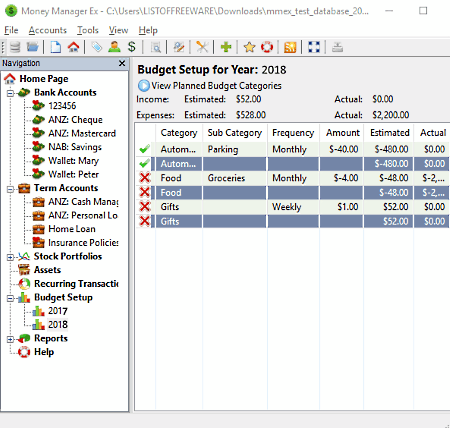
Money Manager EX is a free open source budgeting software for Windows. This software can also be used as an open source personal finance software as it mainly used to organize personal finances and to keep track of expenditure. To use this software, first, you need to create a new account where you need to define type of account like cash, checking, credit card, loan, term, investment, assets, etc. After that, you can select various expenditure and income categories like Food, Bills, Rent, Taxes, Employer, Business, etc. from the Tools menu. According to your country, you can also choose your native currency from this software.
After creating the account and specifying all the expenditure and income parameters, you can now set up the budget. To do that, go to Tools > Budget Setup and set up budgets in terms of the calendar months, year, or fiscal year. Now, specify the amount that you want to spend on different expenditure categories that you have created previously. Do not forget to regularly update your expenditure to prevent yourself from expending more than budget.
In this software, you can also view your Monthly/Yearly usage report, Payee report, Budget performance report, Income vs Expense report, etc. Additionally, this software also lets you import/export all budget-related information in CSV, XML, HTML, and QIF formats.
Budgeter
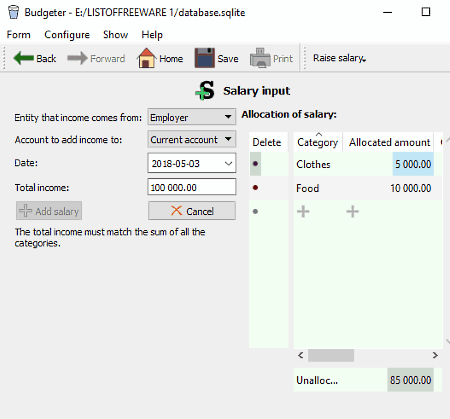
Budgeter is another free open source budgeting software for Windows. This software helps you create a budget for yourself. In it, you can simply create various expenditure categories (food, conveyance, cloths, etc.) and allocate a specific amount of budget to each category. You need to regularly fill your daily expenditures in specified categories so that you do not spend over the specified budget. Besides budget, you can also keep track of the remaining amount after all the expenditure.
This software can also be used to manage budgets of multiple users. To do so, you need to add multiple accounts along with various income and expenditure entities like Employer, Business, Cloths, Daily Expenditure, etc. According to the defined income and expenditure details, this software shows you the total of the unallocated amount (savings) and allocated account (expenditure) in the tabular form. A separate Interest Input section is also present in here using which you can keep track of interest that you get from banks.
In this free open source budget software, you can also view the whole summary of your monthly expenses, yearly expenses, or expenses within a specified time duration. Plus, details related to transactions can also be maintained like date of the transaction, amount of transaction, category of transaction, etc.
KMyMoney
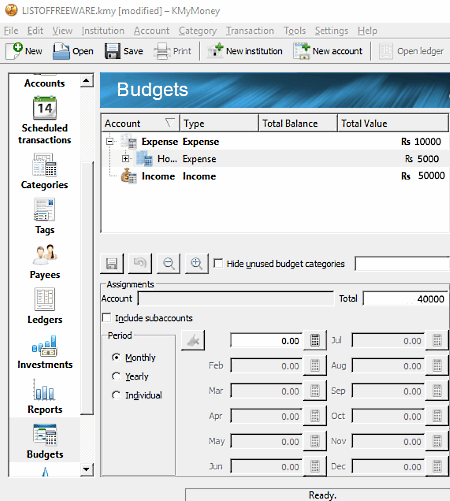
KMyMoney is yet another free open source budgeting software for Windows. It is primarily used to manage personal finances, but it also got some budgeting options. Therefore, you can use this freeware to categorize your sources of income and expenses, manage payees, ledgers, investments, etc.
This software provides a Budget Menu on its interface using which you can assign a monthly and yearly budget. According to your expenditure, regularly update different categories of expenditure to keep track on your expenses and the remaining amount. As this software is a personal financial software, hence tracking your income is also pretty easy. Budget Forecasting is another handy feature that shows you the expected expenditure by analyzing your previous expenditure behaviors.
In this software, you can also generate various budget reports like yearly budget report, monthly budget report, monthly budget vs actual expenditure report, yearly budgeted vs actual report, etc. Plus, reports related to Income and Expenses, Networth, Transactions, Cashflow, etc. can also be viewed from the Reports Section.
dsbudget
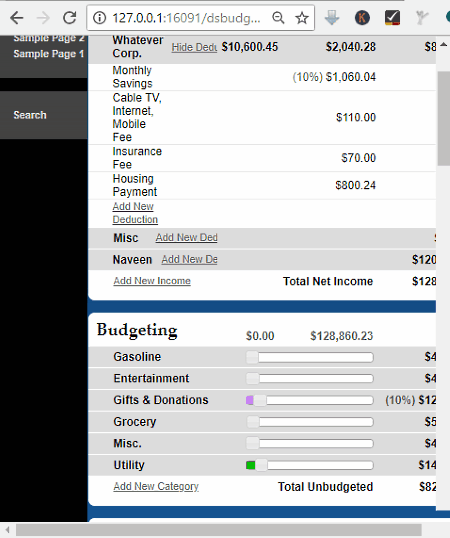
dsbudget is the next free open source budgeting software for Windows. It is a web-based software that requires a browser to run. However, it does not need internet to work.
This is a straightforward budgeting software in which you can create monthly budgets. Before creating the budget, you need to enter your income along with fixed monthly deductions like TV bills, Internet bills, Insurance, House payments, etc. After that, go to the Budgeting Section and specify monthly expenditure targets for categories like Entertainment, Gasoline, Grocery, Utility, etc. With each category, you get a slide bar that you can move in right or left direction to increase or decrease the expenditure budget.
It is also necessary to update all your expenditures in regular interval. You can update all your expenditures in Expenses Section, where you need to provide category, date, and amount of expenditure. According to the provided expenditure, you can view the remaining expenditure left of each category on the interface. Along with remaining expenditure, it also provides graphs for each category for visual representation.
Overall, it is one of the simplest open source budgeting software that you can get for free.
HomeBank
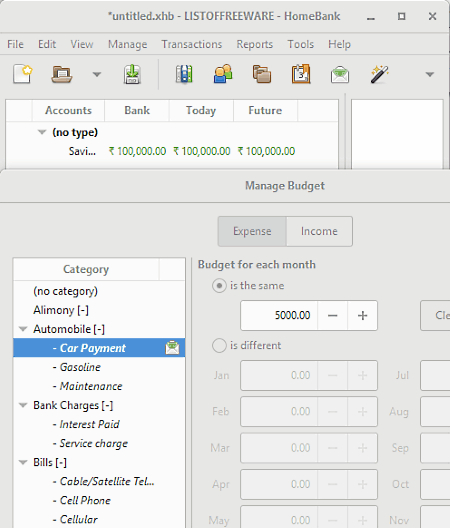
HomeBank is the next free open source budgeting software for Windows. It is mainly a money management software through which you can analyze your income, expenses, transactions, etc. in details using various tools and graphs.
To manage the budgets, it provides a dedicated budget section in the Manage Menu. This budget section is initially disabled. So, to enable it, you need to create an account by submitting important information like Currency Type, Account Type (bank, asset, cash, etc.), Account Balance, etc. After that, go to the categories section and define Expenses (Bills, Education, Food, Gifts, etc.) and Income Categories (Capital Gains, Bonus, Salary, etc.). Lastly, open the Budget section and set a budget for each defined expense category. After that, you just need to update the budget with actual expenses to know the balance in each category.
In this software, you can also view the detailed Budget Report, Balance Report, Transaction Report, and Statistics. This software does not let you save reports, but you can save the whole account information in a QIF file.
jGnash
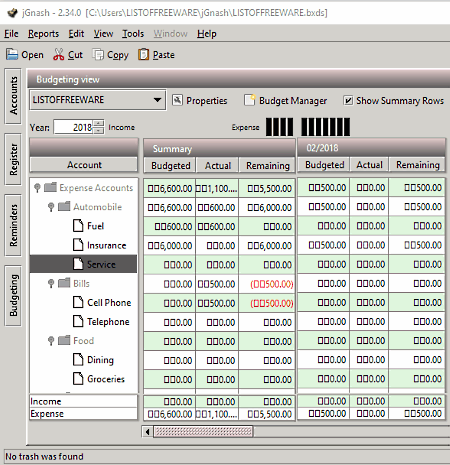
jGnash is yet another free open source budgeting software. It is a cross-platform software that works with Windows, Linux, and Mac OSX. It is a really good software to manage personal budgets and accounts.
When you first launch this software, an account setup will start automatically, in which you need to set the Currency, Account Type, Bank Name, Current Amount, etc. After the setup, the main interface of this free budget software will open up. On the left part of the interface, you can view the main Account, Budgeting, Reminders, etc. sections.
In the Account section, you can view your Bank Accounts and Expense Accounts with important information like Balance, Reconciled Balance, Account Type, etc. From this section, you can easily update Withdrawal Amount, Credited Amount, Expense Account, etc. to keep account up to date.
Now, if you go to the Budgeting Account, you can view your Expenses Account with various sub-categories like Automobile, Food, Health, Household, Miscellaneous, etc. By double-clicking on any expense category, you can allocate the monthly budget for a particular expense category. In front of the Expense Account, you can view the monthly budget allocation tables. In each table, you can view Budgeted Amount, Actual Amount, and Remaining Budget. These budget allocation tables will automatically update itself when you update the Expense Account of Accounts section.
There are more handy features that this software contains such as Auto-completion of form fields, Transaction Scheduler, Customizable User Interface, Investment Accounts, and more.
Buddi
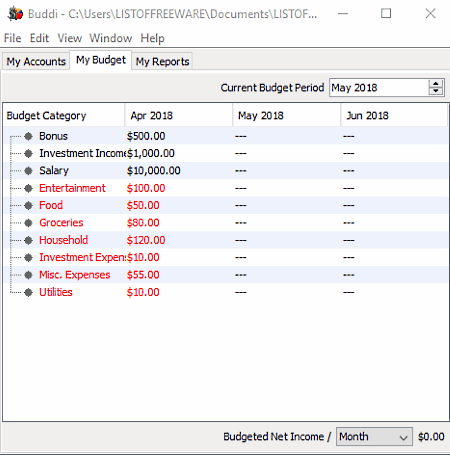
Buddi is a completely free, open source budgeting software for Windows. This software makes management of personal finance and budgeting easy. It has three menus on its interface, namely, My Accounts, My Budget, and My Reports.
The My Accounts menu is mainly used to manage multiple accounts with all their information. However, in order to create an account, you need to use Create Account option of Edit Menu. By providing the Account name, Account type (Cash Investment, Savings, etc.), and Starting balance, you can create an account.
In the My Budget menu, you can enter the income amount from various sources of a particular month. These income sources are classified in three categories bonus, investment income, and salary. At the same time, you can also list your expenses incurred in that month on various things such as entertainment, auto, household, utilities, etc. Now, the software will automatically calculate and show the remaining budget by analyzing the entered data.
It also has options to set budget period as weekly, monthly, yearly, semi-monthly, etc. You can easily generate various reports for your income and expenses in HTML format, and also export added data in Buddi Live format.
DailyCashManager
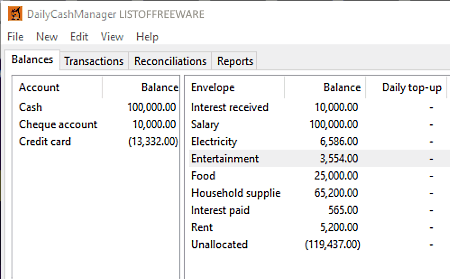
DailyCashManager is a free and open source budgeting software for Windows. This software makes allocation and management of budgets really easy. In this software, you need to create expenditure fields (food, bills, transport, etc.) and allocate budget for each field at the time of Account creation. Besides this, standard account details like Account Name, Initial Balance, Account Type (Cash, Credit, Cheque, etc.), etc. are also needed to be filled to create an account. After the setup, the main interface of this free budget software will open up. On the interface, you can view four main tabs namely, Balances, Transactions, Reconciliations, and Reports.
In the Balances Tab, you can view all the assigned budget for each category along with total balance. This tab is also used to update your balance by providing the actual expenditure data. From the Transactions Tab, you can quickly find all the transactions occurred between two dates. The Reconciliation Tab acts similar to transactions tab, using which you can check the Reconciled Budget between two dates. With the help of Reports tab, you can quickly find out the balance sheet and Income and Expenditure Report between any two dates.
Overall, it is an easy to use open source budgeting software to manage personal budgets.
GnuCash
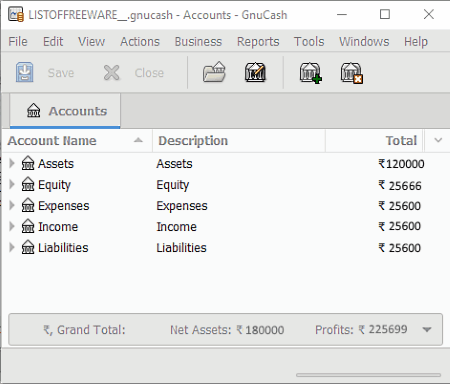
GnuCash is next freeware in this list of open source budgeting software for Windows. This software is suitable for the management of both personal and small business finances. Like other similar software, you can allocate monthly budget in it. However, it does not let you define and allocate budget for various expenditure categories. Instead, you can only define a total monthly budget under the Expense category. By going to Actions > Budget menu, you can also view your total income, expenses, transfers, and total money left after all the deductions. It also contains an Advanced Report section through which you can view Budget Balance Sheet, Budget Chart, Budget Flow, Budget Report, etc.
This software does not only let you manage budget, income, and expenses, but a variety of bank account and even stocks can also be managed with it. GnuCash also has experimental database support, repayment assistant, account reconciliation features, and a lot more. Overall, it is one of the feature rich budgeting software that you can get in free.
Eqonomize
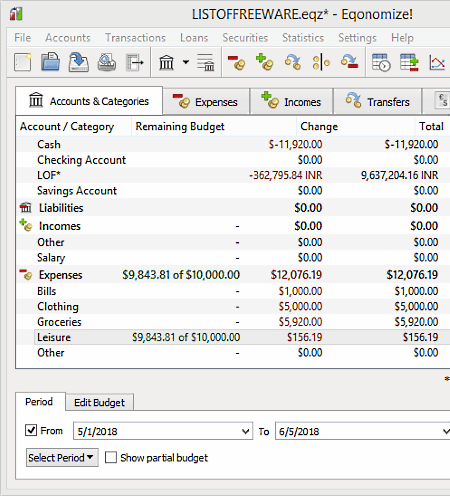
Eqonomize is another completely free open source budgeting software for Windows. This software is used as a personal accounting software through which you can keep track of your Income, Expenditures, Transactions, Loans, etc.
In this software, you can easily create and assign budget from its Accounts & Categories section. In this section, you can view various predefined Expenses categories like Bills, Clothing, Groceries, Leisure, etc. You can assign budgets to predefined expense categories. More expense categories can also be added to this software. You can also specify the time period for the budget from the Period Tab which is present on the bottom of the interface. There is also a section named Expenses in which you can update the expense amount, date of expense, category of expense, etc. According to the updated expense amount, this software will update the category wise remaining budget along with the total remaining amount.
This software can also generate various Reports (Income & Expenses and Profit) and Charts (all expenses chart with or without expense categories, accounts chart, income chart, etc.) to give you the visual representation of your accounts. You can save the reports as HTML file and charts as PNG, JPEG, TIFF, and BMP images. Plus, you can also export your whole account in a QIF file.
Naveen Kushwaha
Passionate about tech and science, always look for new tech solutions that can help me and others.
About Us
We are the team behind some of the most popular tech blogs, like: I LoveFree Software and Windows 8 Freeware.
More About UsArchives
- April 2024
- March 2024
- February 2024
- January 2024
- December 2023
- November 2023
- October 2023
- September 2023
- August 2023
- July 2023
- June 2023
- May 2023
- April 2023
- March 2023
- February 2023
- January 2023
- December 2022
- November 2022
- October 2022
- September 2022
- August 2022
- July 2022
- June 2022
- May 2022
- April 2022
- March 2022
- February 2022
- January 2022
- December 2021
- November 2021
- October 2021
- September 2021
- August 2021
- July 2021
- June 2021
- May 2021
- April 2021
- March 2021
- February 2021
- January 2021
- December 2020
- November 2020
- October 2020
- September 2020
- August 2020
- July 2020
- June 2020
- May 2020
- April 2020
- March 2020
- February 2020
- January 2020
- December 2019
- November 2019
- October 2019
- September 2019
- August 2019
- July 2019
- June 2019
- May 2019
- April 2019
- March 2019
- February 2019
- January 2019
- December 2018
- November 2018
- October 2018
- September 2018
- August 2018
- July 2018
- June 2018
- May 2018
- April 2018
- March 2018
- February 2018
- January 2018
- December 2017
- November 2017
- October 2017
- September 2017
- August 2017
- July 2017
- June 2017
- May 2017
- April 2017
- March 2017
- February 2017
- January 2017
- December 2016
- November 2016
- October 2016
- September 2016
- August 2016
- July 2016
- June 2016
- May 2016
- April 2016
- March 2016
- February 2016
- January 2016
- December 2015
- November 2015
- October 2015
- September 2015
- August 2015
- July 2015
- June 2015
- May 2015
- April 2015
- March 2015
- February 2015
- January 2015
- December 2014
- November 2014
- October 2014
- September 2014
- August 2014
- July 2014
- June 2014
- May 2014
- April 2014
- March 2014
